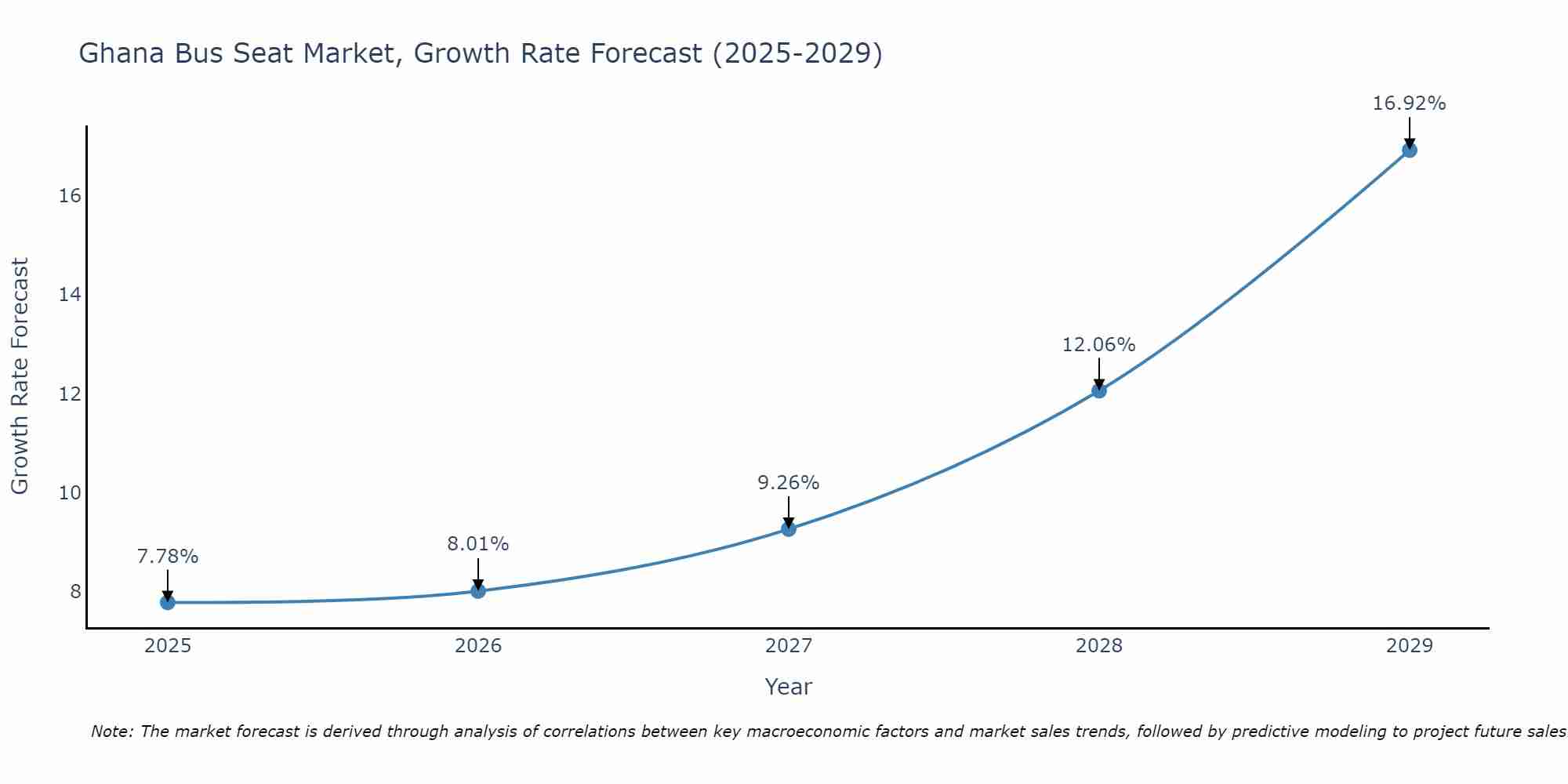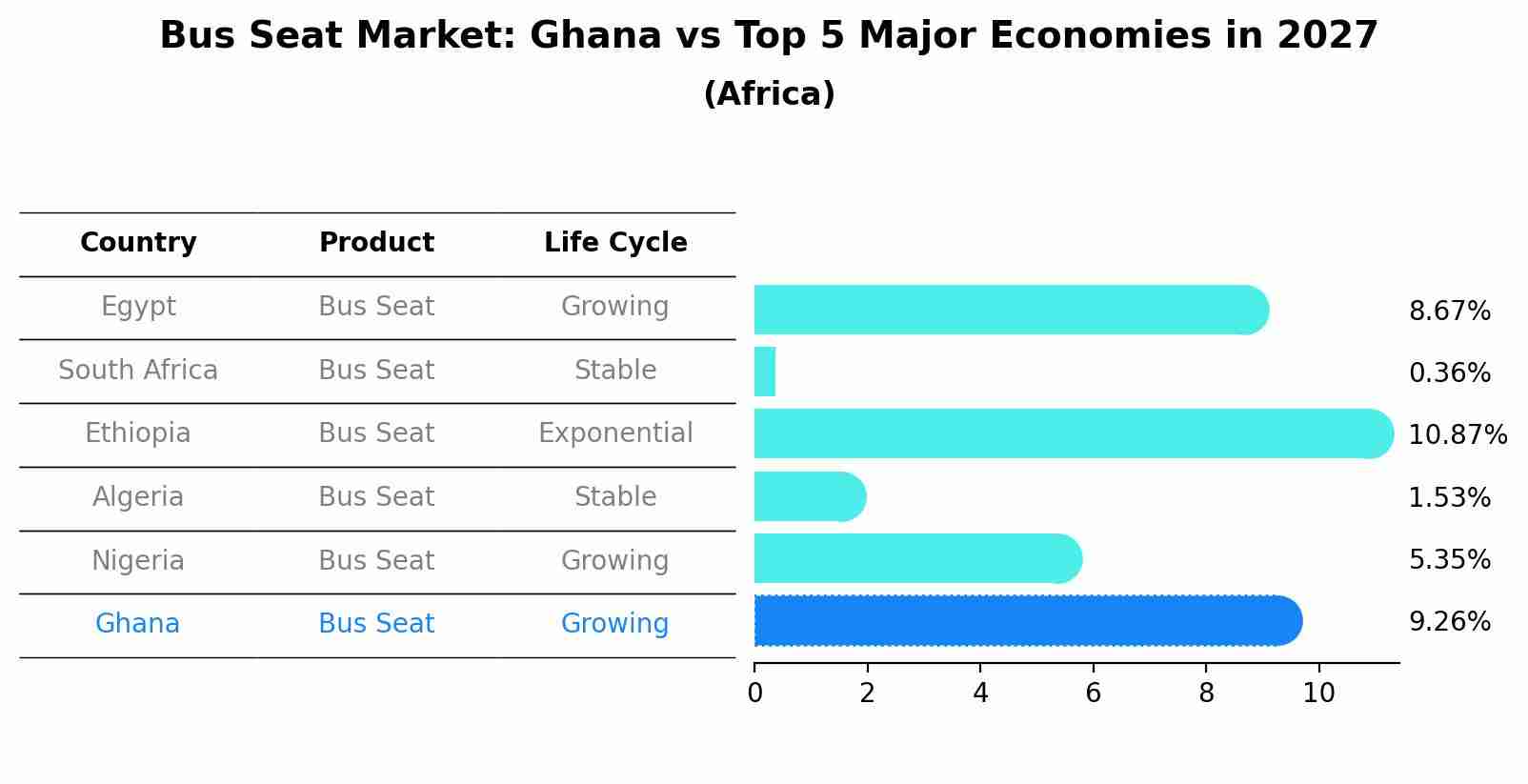Ghana Bus Seat Market (2025-2031) Outlook | Revenue, Trends, Industry, Value, Share, Companies, Analysis, Growth, Forecast & Size
| Product Code: ETC371096 | Publication Date: Aug 2022 | Updated Date: Jul 2025 | Product Type: Market Research Report | |
| Publisher: 6Wresearch | Author: Vasudha | No. of Pages: 75 | No. of Figures: 35 | No. of Tables: 20 |
Ghana Bus Seat Market Size Growth Rate
The Ghana Bus Seat Market is likely to experience consistent growth rate gains over the period 2025 to 2029. Commencing at 7.78% in 2025, growth builds up to 16.92% by 2029.

Bus Seat Market: Ghana vs Top 5 Major Economies in 2027 (Africa)
By 2027, the Bus Seat market in Ghana is anticipated to reach a growth rate of 9.26%, as part of an increasingly competitive Africa region, where Egypt remains at the forefront, supported by South Africa, Ethiopia, Algeria and Nigeria, driving innovations and market adoption across sectors.

Ghana Bus Seat Market Synopsis
The Ghana bus seat market is witnessing steady growth driven by increasing investments in public transportation infrastructure and rising demand for comfortable seating solutions. The market offers a range of bus seats catering to different types of buses, including intercity coaches, urban transit buses, and minibusses. Key players in the market offer a variety of seating options, such as reclining seats, high-back seats, and seats with ergonomic designs to enhance passenger comfort. Additionally, the market is characterized by a focus on safety features, durability, and aesthetics to meet the diverse needs of bus operators and passengers. With the government`s initiatives to improve transportation services and the growing urbanization trend in Ghana, the bus seat market is poised for further expansion in the coming years.
Ghana Bus Seat Market Trends
As of late, the Ghana Bus Seat Market is witnessing several key trends. One prominent trend is the increasing demand for more comfortable and ergonomic bus seats to enhance passenger experience during long journeys. Additionally, there is a growing preference for seats with built-in amenities such as USB charging ports, cup holders, and adjustable headrests. Sustainability is also becoming a critical consideration, with bus operators and manufacturers increasingly opting for eco-friendly materials and production processes. Another notable trend is the integration of technology in bus seats, including features like entertainment screens, Wi-Fi connectivity, and seat sensors for enhanced safety and passenger convenience. Overall, the Ghana Bus Seat Market is evolving to meet the changing preferences and priorities of both operators and passengers.
Ghana Bus Seat Market Challenges
In the Ghana Bus Seat Market, challenges include the presence of counterfeit and low-quality products that undermine the reputation of genuine seat manufacturers. Additionally, the market faces issues related to inconsistent demand due to fluctuations in the transportation sector and economic conditions. Limited access to financing for bus operators and seat manufacturers also hinders market growth and development. Furthermore, the lack of standardization and regulations in the industry leads to varying product quality and safety concerns for passengers. Addressing these challenges will require collaboration between industry stakeholders, government bodies, and financial institutions to improve product quality, ensure market stability, and enhance overall customer satisfaction in the Ghana Bus Seat Market.
Ghana Bus Seat Market Investment Opportunities
The Ghana bus seat market presents promising investment opportunities due to the country`s growing public transportation sector and increasing demand for comfortable and durable seating solutions. Investing in high-quality, ergonomic bus seats designed for long-distance travel could yield significant returns as bus operators seek to enhance passenger comfort and satisfaction. Additionally, there is a trend towards modernizing and upgrading public transportation fleets in Ghana, creating a demand for innovative and technologically advanced seating options. Collaborating with local bus manufacturers or transportation companies to provide customized seating solutions tailored to their specific needs could be a lucrative investment strategy in the Ghanaian bus seat market. Overall, investing in the Ghana bus seat market offers the potential for growth and profitability in line with the country`s expanding transportation industry.
Jordan Agar Market Government Policies
The Ghanaian government has implemented various policies to regulate the bus seat market in the country. These policies include setting standards for safety and quality of bus seats to ensure passenger comfort and security. Additionally, the government has introduced regulations to control pricing and prevent price gouging within the market. The government also collaborates with industry stakeholders to address issues such as overcrowding, overloading, and adherence to schedules to improve the overall efficiency of the bus seat market. Overall, these policies aim to promote fair competition, protect consumer interests, and enhance the overall quality of bus transportation services in Ghana.
Ghana Bus Seat Market Future Outlook
The future outlook for the Ghana Bus Seat Market appears promising, with steady growth anticipated due to factors such as increasing urbanization, rising disposable incomes, and expanding public transportation networks. The demand for comfortable and durable bus seats is likely to rise as the transportation industry modernizes and upgrades its fleets to meet the growing needs of passengers. Moreover, with a focus on improving passenger safety and comfort, bus operators are expected to invest in high-quality seating solutions. Technological advancements in seat design, such as ergonomic features and enhanced materials, are also likely to drive market growth. Overall, the Ghana Bus Seat Market is poised for expansion in the coming years, presenting opportunities for manufacturers and suppliers to cater to the evolving needs of the transportation sector.
Key Highlights of the Report:
- Ghana Bus Seat Market Outlook
- Market Size of Ghana Bus Seat Market, 2024
- Forecast of Ghana Bus Seat Market, 2031
- Historical Data and Forecast of Ghana Bus Seat Revenues & Volume for the Period 2021 - 2031
- Ghana Bus Seat Market Trend Evolution
- Ghana Bus Seat Market Drivers and Challenges
- Ghana Bus Seat Price Trends
- Ghana Bus Seat Porter's Five Forces
- Ghana Bus Seat Industry Life Cycle
- Historical Data and Forecast of Ghana Bus Seat Market Revenues & Volume By Seat Type for the Period 2021 - 2031
- Historical Data and Forecast of Ghana Bus Seat Market Revenues & Volume By Standard for the Period 2021 - 2031
- Historical Data and Forecast of Ghana Bus Seat Market Revenues & Volume By Recliner for the Period 2021 - 2031
- Historical Data and Forecast of Ghana Bus Seat Market Revenues & Volume By Component Type for the Period 2021 - 2031
- Historical Data and Forecast of Ghana Bus Seat Market Revenues & Volume By Frame for the Period 2021 - 2031
- Historical Data and Forecast of Ghana Bus Seat Market Revenues & Volume By Upholstery for the Period 2021 - 2031
- Ghana Bus Seat Import Export Trade Statistics
- Market Opportunity Assessment By Seat Type
- Market Opportunity Assessment By Component Type
- Ghana Bus Seat Top Companies Market Share
- Ghana Bus Seat Competitive Benchmarking By Technical and Operational Parameters
- Ghana Bus Seat Company Profiles
- Ghana Bus Seat Key Strategic Recommendations
Frequently Asked Questions About the Market Study (FAQs):
- Single User License$ 1,995
- Department License$ 2,400
- Site License$ 3,120
- Global License$ 3,795
Search
Thought Leadership and Analyst Meet
Our Clients
Related Reports
- Afghanistan Apparel Market (2026-2032) | Growth, Outlook, Industry, Segmentation, Forecast, Size, Companies, Trends, Value, Share, Analysis & Revenue
- Canada Oil and Gas Market (2026-2032) | Share, Segmentation, Value, Industry, Trends, Forecast, Analysis, Size & Revenue, Growth, Competitive Landscape, Outlook, Companies
- Germany Breakfast Food Market (2026-2032) | Industry, Share, Growth, Size, Companies, Value, Analysis, Revenue, Trends, Forecast & Outlook
- Australia Briquette Market (2025-2031) | Growth, Size, Revenue, Forecast, Analysis, Trends, Value, Share, Industry & Companies
- Vietnam System Integrator Market (2025-2031) | Size, Companies, Analysis, Industry, Value, Forecast, Growth, Trends, Revenue & Share
- ASEAN and Thailand Brain Health Supplements Market (2025-2031) | Strategy, Consumer Insights, Analysis, Investment Trends, Opportunities, Growth, Size, Share, Industry, Revenue, Segments, Value, Segmentation, Supply, Forecast, Restraints, Outlook, Competition, Drivers, Trends, Demand, Pricing Analysis, Competitive, Strategic Insights, Companies, Challenges
- ASEAN Bearings Market (2025-2031) | Strategy, Consumer Insights, Analysis, Investment Trends, Opportunities, Growth, Size, Share, Industry, Revenue, Segments, Value, Segmentation, Supply, Forecast, Restraints, Outlook, Competition, Drivers, Trends, Demand, Pricing Analysis, Competitive, Strategic Insights, Companies, Challenges
- Europe Flooring Market (2025-2031) | Outlook, Share, Industry, Trends, Forecast, Companies, Revenue, Size, Analysis, Growth & Value
- Saudi Arabia Manlift Market (2025-2031) | Outlook, Size, Growth, Trends, Companies, Industry, Revenue, Value, Share, Forecast & Analysis
- Uganda Excavator, Crane, and Wheel Loaders Market (2025-2031) | Strategy, Consumer Insights, Analysis, Investment Trends, Opportunities, Growth, Size, Share, Industry, Revenue, Segments, Value, Segmentation, Supply, Forecast, Restraints, Outlook, Competition, Drivers, Trends, Demand, Pricing Analysis, Competitive, Strategic Insights, Companies, Challenges
Industry Events and Analyst Meet
Whitepaper
- Middle East & Africa Commercial Security Market Click here to view more.
- Middle East & Africa Fire Safety Systems & Equipment Market Click here to view more.
- GCC Drone Market Click here to view more.
- Middle East Lighting Fixture Market Click here to view more.
- GCC Physical & Perimeter Security Market Click here to view more.
6WResearch In News
- Doha a strategic location for EV manufacturing hub: IPA Qatar
- Demand for luxury TVs surging in the GCC, says Samsung
- Empowering Growth: The Thriving Journey of Bangladesh’s Cable Industry
- Demand for luxury TVs surging in the GCC, says Samsung
- Video call with a traditional healer? Once unthinkable, it’s now common in South Africa
- Intelligent Buildings To Smooth GCC’s Path To Net Zero


















